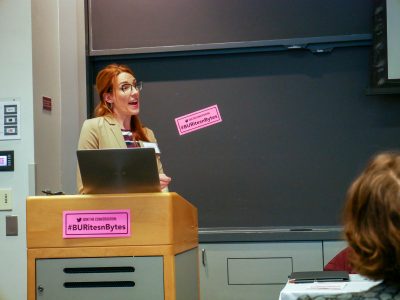
People from as far as California and as near as Cambridge flocked to Boston University’s Photonics Center Saturday to explore the relationship between religion and technology. BU’s Graduate Program in Religion Student Association hosted the “Conference on Religion and Technology.”
The conference aimed to form a holistic view of the intersection of the two fields, according to Jordan Conley, one of the event’s organizers and a Ph.D. candidate in the Graduate School of Arts and Sciences studying religion. The central piece of the event was a keynote address by Kathryn Lofton, Ph.D., a professor of religious studies at Yale University.
She focuses on the impact of religion on social media and vice versa, but said she does not have any social media herself because she finds the nature of it overwhelming.
“I’m an addictive person,” said Lofton during her address. “I already write enough thank you notes, and I can’t bear the idea of following up on online comments. My compulsive tendencies, distractible energies and anxiety to please make the publicity of a social media persona wholly impossible.”
But Lofton quickly shifted away from her ideas on social media in order to spend time discussing the events of Thursday and Friday, regarding the Senate hearing on Supreme Court nominee Brett Kavanaugh.
“I had prepared a talk that I am going to briefly summarize at the beginning of my remarks, but I’ve decided not to give it,” Lofton said in an interview. “I’ve decided to do something else in light of what happened on Thursday.”
Lofton recognized the unexpected shift in her talk from religion and social media to sexual assault and eventually turned her address back toward the study of religion, particularly in graduate programs.
She went on to explain that technological advancements that aid communication have stripped academia from its assuredness and changed the focus from listening to speaking.
“Scholars have tried to think positively about social media, and the study of religion is really a discipline that is often forged in people studying things they have ambivalent relationships to,” Lofton said in an interview. “Religion and technology is a nearly booming field of inquiry in religious studies.”
At the conclusion of her talk, she reminded the listeners that the entanglement of technology and academia provides platforms for a wider conversation and can elevate voices other than scholars within a given field, which leads to more diverse opinions.
The audience was then given the chance to ask Lofton any questions they may have had after the address. Joseph Fisher, a Ph.D. candidate studying religion at Columbia University, said the event was a great opportunity for him to discover other opinions on the subject matter.
“I try to come at religious studies from a religion and technology perspective,” Fisher said. “I was so excited to see such a great conference on it, and I’m constantly trying to revise my own perspectives, so this is a great opportunity for engagement.”
Fisher asked the first question in the Q&A about how scholars’ presence on social media affects how they and their work are perceived in the field.
In response, Lofton said that a social media presence blurs the line between people’s professional and personal lives, especially in the field of religion. Other questions regarded sexual assault allegations in the academic world and the role of patriarchy in religious studies.
Conley said that they host a conference every year, and technology seemed to be a good fit for this year’s event because that seemed to be a common theme in current conversations in the world of religious studies.
“We were really interested in how people would interpret the ‘and Technology’ part of the conference because I think everyone heard or read that in a completely different way, and that’s what we were hoping for,” Conley said.
The range of topics included how YouTube comments, cyborgs and SoulCycle have played a role in the discussion of religion and the role of religion on Mars.
“Even if you’re not a scholar of religion, religion still plays a very important role in our culture and society,” Conley said in an interview. “People would be surprised by the breadth of the papers and all of the topics that are covered under the name of ‘religious studies.’”



























































































































